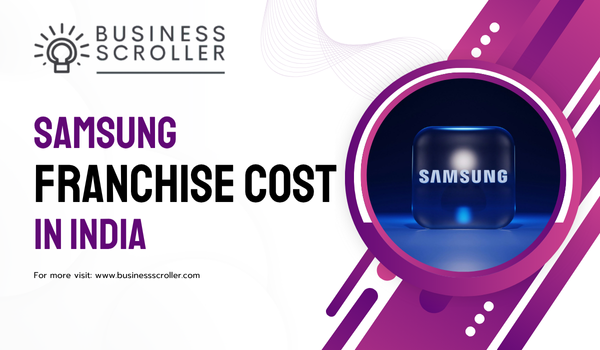Samsung is one of the most trusted consumer-electronics names in India — known for smartphones, TVs, home appliances and commercial display solutions. That brand power makes a Samsung retail franchise (branded store / Smart Café / authorised dealer) an attractive option for entrepreneurs who want a high-value electronics retail business rather than an unbranded shop. Below I break down realistic costs, franchise models Samsung uses in India, expected ROI, who’s eligible, and the exact steps to apply — using official Samsung pages and franchise industry sources to ground the numbers.
Quick Snapshot
- Typical formats you’ll see in India: Samsung Smart Café / Samsung Exclusive Store / authorised dealer outlets / service centres. Samsung also works with channel partners across tiers (Platinum/Gold/Silver/Registered).
- Typical space requirement: ~600–1,200 sq.ft for a Smart Café/Exclusive store; smaller multi-brand kiosks or shop-in-shop formats require less.
- Ballpark investment: franchise industry listings estimate ₹30–70 lakh for a Smart Café / exclusive flagship format (space, inventory, design), while smaller authorised dealer setups are reported in the ₹20–40 lakh band depending on format. Third-party franchise portals commonly show a franchise fee + infra investment split (examples below).
How Samsung’s Franchise / Partner Model Usually Works

Samsung primarily operates through channel partners and authorised dealers rather than a one-size-fits-all public franchise ad. The brand offers different partner tiers (Platinum/Gold/Silver/Registered) and retail concepts (Smart Café / Exclusive Store) where partners get product supply, brand assets, merchandising guidelines, marketing support and, for service partners, technical training and spare-parts access. Samsung’s official Business/Partners pages are the place to start enquiries.
Commercials (franchise fee, inventory commitments, and any revenue share or margins) are typically provided after a formal partner discussion and feasibility check — they are negotiated by geography and format. Third-party franchise listings summarise historic ranges but you must request the official partner pack from Samsung for exact terms.
Detailed Cost Breakdown
These are industry estimates aggregated from franchise portals and retailer lists. Treat them as modeling inputs — request Samsung’s official pack to get precise, location-specific numbers.
- Franchise / onboarding fee (one-time): often reported around ₹10–25 lakh depending on format (exclusive outlet vs smaller dealer).
- Fit-out / interiors & equipment: ₹10–40 lakh (depends on store size, furnishing, demo areas, signage and digital displays). Smart Café concepts require premium demo installations and display walls which raise costs.
- Initial inventory / stock: ₹10–30 lakh+ (mobiles, TVs, appliances — inventory value varies greatly by product mix and whether you carry white goods/heavy appliances).
- Working capital, marketing & deposits: ₹2–10 lakh (advance rent, staff, initial promos, logistics).
- Estimated total (conservative): ₹30 lakh (lean, small dealer) up to ₹70 lakh (Smart Café / exclusive flagship) or more in premium metro locations.
Expected ROI & Breakeven
- Industry listings and franchising portals suggest breakeven for well-located Samsung Exclusive/Smart Café stores often occurs in 12–24 months, but this varies strongly with rent, product mix and sales velocity (mobiles sell fast, TVs/home-appliances are higher value but slower turns).
- Margins in electronics retail are usually modest on flagship products (low single-digit to mid-single digit % on some devices) but higher on accessories and services — plan financials around gross margin mix and aim to cross-sell service plans/accessories to lift overall profitability.
- Conservative planning: model a 12–24 month ramp, keep 6–9 months of operating expenses as buffer, and focus on increasing average transaction value, service revenue, and extended-warranty sales to improve ROI.
Eligibility & What Samsung Looks For in Partners
Samsung typically prefers partners who have:
- Proven retail experience or strong distribution credentials (especially for larger formats).
- Financial strength to fund capex, inventory and working capital.
- Suitable real estate: frontage and location that fits the Samsung format (600–1,200 sq.ft for Smart Café).
- Operational capability to follow brand SOPs and run staff, demo areas, and after-sales support.
- Compliance readiness (GST, business registrations) and local market knowledge.
For service-centre or spare-parts partners, Samsung requires technical capability, trained technicians, and adherence to service quality norms (Samsung provides training and parts channels).
Step-by-Step: How to Apply
- Self-assess & choose format — decide Smart Café/Exclusive store vs smaller authorised dealer or service centre and your target city.
- Prepare documents — business profile, financial statements / proof of funds, proposed site details (photos, lease terms), retailers’ experience.
- Contact Samsung Business / Partner team — use Samsung India’s Business/Contact pages to request partner information or locate partner-locator pages. Ask explicitly for the partner/franchise pack for your chosen format.
- Site feasibility & discussion — Samsung’s retail/real-estate team will evaluate footfall, catchment and brand fit; negotiate commercial terms and supply conditions.
- Sign agreement & payments — review franchise/partnership contract closely (royalty/margin structure, exclusivity, support levels, tenure, termination clauses). Seek legal review.
- Fit-out, inventory & training — implement store design, install demo displays, train staff via Samsung’s programs, and stock products. Samsung supports merchandising and launch activities.
- Launch & operate — leverage Samsung marketing calendars, run demos, upsell service plans, and monitor KPIs (sales per sq.ft, attachment rate on accessories/warranties, after-sales revenue).
Practical tips & red flags
- Negotiate rent hard — rent is usually the biggest recurring cost that determines your net profitability.
- Clarify inventory terms — understand credit/return policy and timelines for supply during launch.
- Ask for references — speak with existing Samsung partners in your region about real sales, support responsiveness and hidden costs.
- Beware of “one-size” portal numbers — many franchise sites publish ranges that are indicative; always verify with Samsung’s official team.
Final word
A Samsung franchise or authorised dealership is a premium retail opportunity with strong brand pull, but it comes with significant capital needs (inventory + experience) and tight operational demands. If you’re serious, start with Samsung Business/Partners contact, request the official partner pack, model conservative cash flows for 12–24 months, and insist on clear written terms for inventory, margins and after-sales support.

Shashi Kant is the Founder and Editor of BusinessScroller.com, a leading platform for business insights, finance trends, and industry analysis. With a passion for journalism and expertise in business reporting, he curates well-researched content on market strategies, startups, and corporate success stories. His vision is to provide valuable information that empowers entrepreneurs and professionals. Under his leadership, BusinessScroller.com has grown into a trusted source for in-depth articles, customer care guides, and financial expertise.


